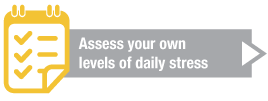How Do My Stress Levels Affect My Risk?
Who is at Risk for Stress?
Any sort of change can make you feel stressed out, but different groups of people react differently and are more sensitive to stress:
- Women:
- Women are more likely than men to report physical and emotional symptoms of stress.
- Many women play significant roles both in the home and in the workforce, making them more susceptible to stress than men.
Watch this video to learn why women are more affected (WebMD).
- Adolescents:
- Teenagers have higher expectations to succeed, the stress of school, numerous extracurricular activities, peer pressure, and job responsibilities.
- Older adults:
- They make up the core working group, with more responsibilities.
- Older adults are most likely to be managing multiple careers and supporting a family, dealing with a reduced income related to retirement, or caring for elderly parents.
- People with chronic illnesses:
- This group has a tendency to focus on illness and the issues surrounding it.
Risks for Anxiety and Depression
Anxiety
There is no single cause for anxiety. Generally, anxiety stems from a combination of factors. Anxiety disorders usually result from more complex causes. The risk for anxiety depends on the following:
- Genetic predisposition
- Past experiences
- Beliefs and behaviours
- Gender (women are more commonly diagnosed or hospitalized with anxiety compared with men)
- Environment (life events)
Depression
Depression can affect anyone at any time. It tends to affect women more than men. Although it can occur at any age, it generally begins in the late teens to mid-20s. The risk for depression increases in heart disease patients. About one in five heart patients experiences clinical depression. Other risk factors include:
- Family history of depression
- Stressful life situations, such as problems with relationships or stress at work, home, or school
- Negative life events (can include childhood abuse or divorce)
- Imbalances in neurotransmitters (chemicals that transmit messages between brain cells)
What Causes Stress?
Stress is caused by the body’s instinctual response to a perceived threat that leads either to battle or escape. This instinct is better known as the fight-or-flight response. The fight-or-flight response occurs when a source of stress is present. The most common stressors include:
- Physical environment
- Family and relationships
- Work
- Life milestones
- Major life changes
What Causes Anxiety?
What Causes Anxiety? Usually, anxiety develops when a combination of risk factors occurs and triggers an emotional overload of sorts. Sometimes anxiety is overshadowed by another mental disorder, such as depression or bipolar disorder (in which episodes of depression and mania are present). When this is the case, it’s hard to tell what the underlying cause of anxiety might be.
What Causes Depression?
There is no single cause of depression, but a combination of factors or situations can increase the risk. The following are considered contributing causes to depression:
- Unfortunate life events
- Illness or disease
- A chemical imbalance in the brain
- Genetics
- Certain medications, which can lead to depression as a side effect
- Drug or alcohol abuse
Symptoms
Symptoms of stress can affect different aspects of your life and can be divided into four categories, as the table outlines.
| Symptoms of Stress | Symptoms of Anxiety | Symptoms of Depression |
|---|---|---|
|
Cognitive (changes in thinking)
Emotion (changes in your emotions)
Physical (changes in your body)
Behavioural (action)
|
Uncontrollable worry Restlessness Irritability Muscle tension Light-headedness Sleeping problems Fatigue Breathing difficulty Increased heart rate Sweating |
|
| View this video about symptoms of stress (WebMD). | ||
Associated Risks
A number of health risks (beyond the anxiety, depression, insomnia, and muscle tension mentioned thus far) may be associated with stress. The most common include:
- Autoimmune diseases
- Gastrointestinal problems
- High blood pressure
- Immune system suppression
- Infertility problems
When you live a stressful life, it can be very difficult to make healthy lifestyle choices. Exposure to high stress levels may cause you to skip exercise or eat unhealthy foods. You may even respond by overeating, smoking, and consuming too much alcohol.6
Diagnosis and Treatment
Stress
Stress does not require a diagnosis because it is not a mental illness. Rather, prolonged stress poses a danger to your mental health that can eventually lead to illness. Because stress is such an individual experience, it’s important you identify what your own personal life stressors are so that you might better address and treat them.
Anxiety
For general anxiety, diagnosis begins with you. Try to identify whether you have experienced any of the following on most days for six months or more:
- Frequent worrying
- Intense focus on certain life situations (work or finances)
- Distress or burden from constant worry
If have experienced any of these, it’s important you seek advice from your doctor or a qualified psychologist or psychiatrist who can provide appropriate options for treatment.
This online tool at Here to Help can evaluate your risk for depression and anxiety. Please note that it is intended as an educational aid and is not designed to provide a clinical diagnosis.
General anxiety can be treated with coping strategies and cognitive therapy, which promote positive thinking and help change anxious thoughts into more positive emotions. More severe anxiety disorders may require medication therapy using antidepressants or anti-anxiety medications.
Depression
Diagnosing depression usually begins with talking to your doctor about any symptoms you are experiencing. Because your doctor may have no idea you’re depressed, it’s important you tell him or her what you’re feeling.
Effective treatment options include cognitive therapy, medication, and supportive counselling. A combination of these may achieve the best results for reducing your feelings of depression.
Find a therapist near you at Psychology Today.
If your feelings of depression are particularly intense or have lasted a long time, you may benefit from consultation with a doctor. If your depression includes physical symptoms, such as sleeping difficulties, loss of appetite, or fatigue, then it is important to speak with a doctor. Antidepressants are sometimes prescribed under these circumstances.
Antidepressants work by correcting chemical imbalances in the brain known to cause depression. There are many different antidepressants available and some people need to try a few to find the right one for their particular symptoms.
While antidepressants seem to be helpful for some people, most of these drugs come with a number of side effects, such as:
- Diminished sex drive
- Dry mouth
- Drowsiness
- Weight changes
Keep in mind that finding the right antidepressant and dosage can take time, and you might not feel the effects of the medication for two to four weeks.


